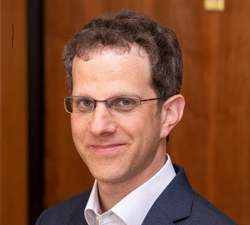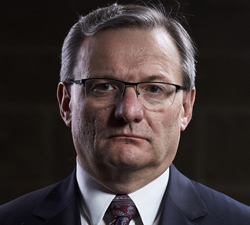Trends and Theories in Business Law Explored at Western Law Business Law Symposium
November 16, 2022

Intercontinental Hotel, Toronto
On November 10 and 11, Western Law hosted some of the world’s most influential business and law scholars at the inaugural Western University Business Law Symposium: “Charting the Path for Law, Governance and Regulation of Corporations and Financial Markets”. This exciting symposium, convened at the Intercontinental Hotel in Toronto, was made possible thanks to the generous sponsorship of Western Law Alum Geoff Beattie.
Papers at the symposium explored the law and regulation of markets and institutions from a variety of perspectives. Roberta Romano, Sterling Professor of Law at the Yale Law School, offered empirical evidence for what she has dubbed in earlier work, “the iron law of financial regulation”. That iron law is that, following financial crises, the US Congress invariably enacts legislation that significantly increases financial regulation resulting in a regulatory “rachet” of ever-expanding layers of regulation that are not only complex but may also include inapt provisions enacted without the benefit of full information.
Mariana Pargendler, of the FGV Law School, Brazil and the Sullivan & Cromwell Visiting Professor of Law at the Harvard Law School, addressed what she described as the “Fading Entity Boundaries in Corporate Law”. Specifically, she surveyed how legal entity boundaries in groups of companies in many jurisdictions worldwide have become increasingly less robust leading to what she called the rise of “entity transparency” in corporate law.
Elizabeth Pollman of the University of Pennsylvania Carey Law School chronicled the origin and evolution of the term ESG (environmental, social and governance issues) Noting that ESG was one of the most notable trends in corporate governance in the past two decades, Professor Pollman traced the history of the term, documented the main usages of the term that have subsequently developed and critically analysed the term, its strengths and weaknesses, use and misuse.
Robert Richardson, of McCarthy Tétrault and Bill Zawada of Laurel Hill Advisory Group then offered their insights into ESG from a practitioners’ perspective, noting the growth in activist activity in corporations and offering some important reflections on the trajectory of ESG.

Prof. Oliver Hart
The Symposium’s keynote address was delivered by Oliver Hart, Lewis P. and Linda L. Geyser University Professor at Harvard University and co-recipient of the 2016 Nobel Prize in Economics. Professor Hart presented work he had undertaken with Luigi Zingales of the University of Chicago Booth School of Business on “The New Corporate Governance.” Noting that the recent rise of shareholder engagement on environmental and social issues was difficult to square with the shareholder wealth maximization norm in corporate governance, he proposed replacing “shareholder wealth maximization” with a concept of “shareholder welfare maximization” and explained how such a principle might work in practice.
Marcel Kahan, the George T. Lowry Professor of Law at NYU Law, presented work he had recently completed with Edward Rock, Martin Lipton Professor of Law at NYU Law. Their paper, entitled, “The Emergence of Welfarist Corporate Governance”, suggested that corporate governance may be entering a new stage, supplanting the view of “shareholderism” that prevailed from the 1970s until the 2008 financial crisis. That new stage, they dubbed “corporate governance welfarism.” This new paradigm, they argued, has been spurred by a series of developments particularly since the 2008 crisis and is characterized by a new balance between shareholders’ interest in value maximization and the pursuit of broader social objectives. While skeptical about the ultimate economic success of welfarism, Professor Kahan was nevertheless optimistic that the rise of welfarism could eventually lead to positive improvements in social regulation.
The final two papers of the Symposium considered important legal and regulatory issues arising in the context of corporate transactions. Jeffrey G. MacIntosh, of the University of Toronto Faculty of Law, presented a paper canvassing the business judgment rule, the public interest powers of Canadian securities regulators and the “fair and reasonable test” applied by the courts in the context of transactions undertaken under the corporate law statutory arrangement provisions, suggesting that in all three of these contexts procedural and substantive review should both play a role. He also provided specific recommendations for modifications to the way in which securities regulators interpret their public interest powers and courts review plans of arrangement.

Prof. Martin Petrin
Martin Petrin, presenting a paper co-authored with Jonathan Chan of the University College of London Faculty of Laws, discussed the implications of the recent judgment of the Ontario Superior Court of Justice in Cineplex v Cineworld, a case in which the court awarded damages based on the target company’s loss of anticipated synergies in the context of a failed M & A transaction
Insightful commentary on the symposium papers was provided by Mohamed Khimji and Gail Henderson of Queen’s University Faculty of Law, P.M. Vasudev of the University of Ottawa Faculty of Law and by Western Law faculty members Alan Miller, the Canada Research Chair in Law and Economics, and Alfonso Nocilla. Virginia Torrie of the University of Manitoba Faculty of Law, and Western Law Faculty members Thomas Telfer, Elizabeth Steyn, Francesco Ducci, Colin Campbell and Carl MacArthur helped steer the proceedings throughout the day as session moderators.

Prof. Chris Nicholls
Dean Erika Chamberlain and Christopher C. Nicholls, W Geoff Beattie Chair in Corporate Law at Western Law and convenor of the Business Law Symposium, thanked Geoff Beattie for making this important symposium possible.
“Western Law’s inaugural Business Law Symposium was a spectacular success,” Professor Nicholls said. “The calibre of the speakers, the quality of discussion and the importance of the topics covered were outstanding. This event was a wonderful way to launch what we hope to become an annual Symposium at Western Law.”






